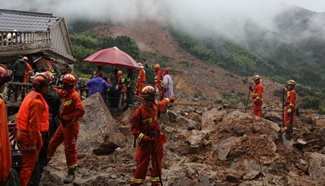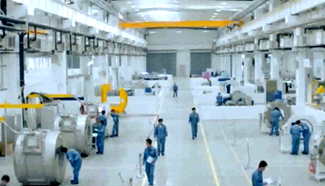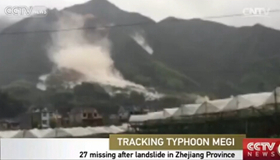by Osama Radi, Saud Abu Ramadan
GAZA, Sept. 29 (Xinhua) -- One year into the latest wave of violence between Israelis and Palestinians, analysts here say the tensions may escalate amid a stubborn stalemate in the peace process.
The violence, which started on Oct. 1, 2015, in the Palestinian territories and Israel, has lead to the death of 230 Palestinians, one Jordanian and 40 Israelis, according to official figures.
In September, the violence worsened, with six Palestinians and one Jordanian killed in alleged stabbing and car-ramming attacks in East Jerusalem and the West Bank. Three Israeli soldiers were injured.
On Thursday, the Islamic Hamas movement called for a "day of rage" on Friday in the West Bank and Jerusalem to mark one year of what it termed as "the Intifada of al-Quds."
The Palestinian National Authority (PNA) holds Israel responsible for the violent outbreak, putting the blame on its policies and the stalemate in the peace process.
Hani al-Masri, a political analyst based in Ramallah, told Xinhua that this wave of tension between Israelis and Palestinians "is less than an Intifada and more than a popular blow-up, in light of the ebb and flow in the tension."
"The Palestinian reaction to Israeli policies was a spontaneous one and without a leader," he said. "It has no goals. It is not well-organized and has no financial support."
Al-Masri said this wave of tension is different from the previous two Intifadas.
"Palestinians were divided on what to call the wave of tension, and several factions tried to use it for their own interests," al-Masri said.
"The main obstacle against using this wave of tension and turning it into a third popular Intifada was the official rejection of a serious confrontation with Israel," he said. "The Palestinian leadership chose to focus more on urging the world toward peace negotiations."
Israeli authorities, seen by some as exploiting this wave of tension to justify continued expanding settlements in East Jerusalem and the West Bank, accuse the PNA of inciting Palestinian youths to carry out more attacks.
The PNA put the blame on Israeli policies and the hopelessness experienced by the Palestinians under Israeli occupation and blockade.
Samih Shbib, a Ramallah-based political analyst, defended the PNA position on the violence.
"I believe that the PNA's declaration that Palestinian attacks against Israelis were individually carried out, yet are justified, was made due to the state of anger among Palestinians and their hopelessness," Shbib said.
He warned that Israeli measures against the Palestinians "would most likely increase the outrage among the Palestinians.
"Increasing these measures would certainly lead to greater outbreaks and substantial attacks in addition to stabbings and car-ramming attacks," Shbib said.
Ashraf Ajrami, a political analyst who once served as a PNA minister, warned that the current political vacuum "would keep the door open for further tension."
"Israel is losing because it refuses to seize the opportunity and opt for a realistic political process leading to two states," Ajrami said.
"The PNA is also losing because it isn't doing a good job of attracting world attention for a genuine intervention," he said. "It also failed to end the internal discord within Palestine."










